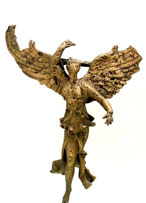| Author | |
|---|---|
| Epoch | XII-XIII |
| Work | The Man in the Panther Skin (Shota Rustaveli, The Man in the Panther Skin, Text and Versions, Edited by Akaki Shanidze and Alexandre Baramidze, Tbilisi, 1966) |
| Type | |
| Quote | “Minstrelsy (i.e. poetry) is, first of all, a branch of wisdom; the excellence of poetry (lit.: poetry is, therefore, Good / goodness)”. (Stanza 12) |
| Term |

| Comment | The poetic theory from the Prologue of “The Man in the Panther’s Skin” is Rustaveli’s original conception of aesthetic and simultaneously ethical and philosophical character: poetry in general - i.e. both the process of the creation of an artistic work by the poet, as well as its perception by the listener / reader and the product of this process, the poetical work itself - is pronounced by the author of the “The Man in the Panther’s Skin” to be goodness (“Good”), from the poetic and aesthetic standpoint, on the one hand, and from the ethical and philosophical viewpoint, on the other, inasmuch as it is, from the ethical and philosophical standpoint: 1) first of all the fruit of wisdom, 2) divine, 3) divinely intelligible, 4) highly useful for the listeners; and, also, 5) it is pleasant in this world as well, for a person fit to listen to [poetry]; and as to the poetic and aesthetic standpoint, it is: 1) long word, 2) told shortly. Taking into consideration the above said the methodological sources of Rustaveli’s poetic theory are: Plato’s “The Republic”(X, 607d), Aristotle’s “Poetics” and “Nicomachean Ethics” (Books VIII and X). See in details: Z. Khintibidze, Towards the Relation of Rustaveli’s Poetic Theory to the Classical Tradition, The Kartvelologist - The Journal of Georgian Studies, vol. 2 (17) - in Georgian and English, http://kartvelologi.tsu.ge. See also Z. Khintibidze, Aristotle’s Conception of the Artistic Unity of Homeric Epic and Rustaveli’s “The Man in the Panther’s Skin”, The Kartvelologist - The Journal of Georgian Studies, vol. 15, Tbilisi, 2009, pp. 60-98 - in Georgian and English. [Z.Kh.] |
|---|

